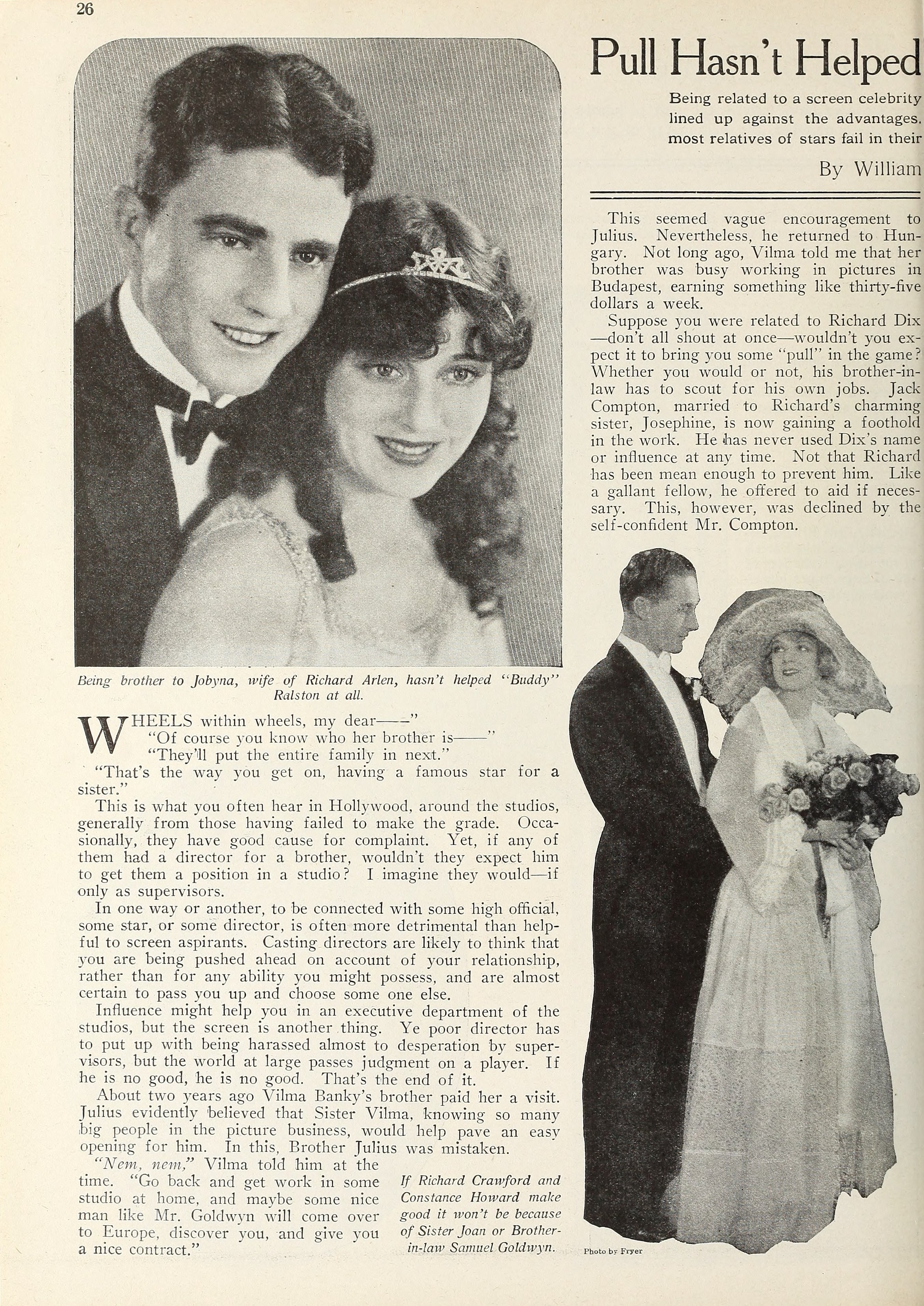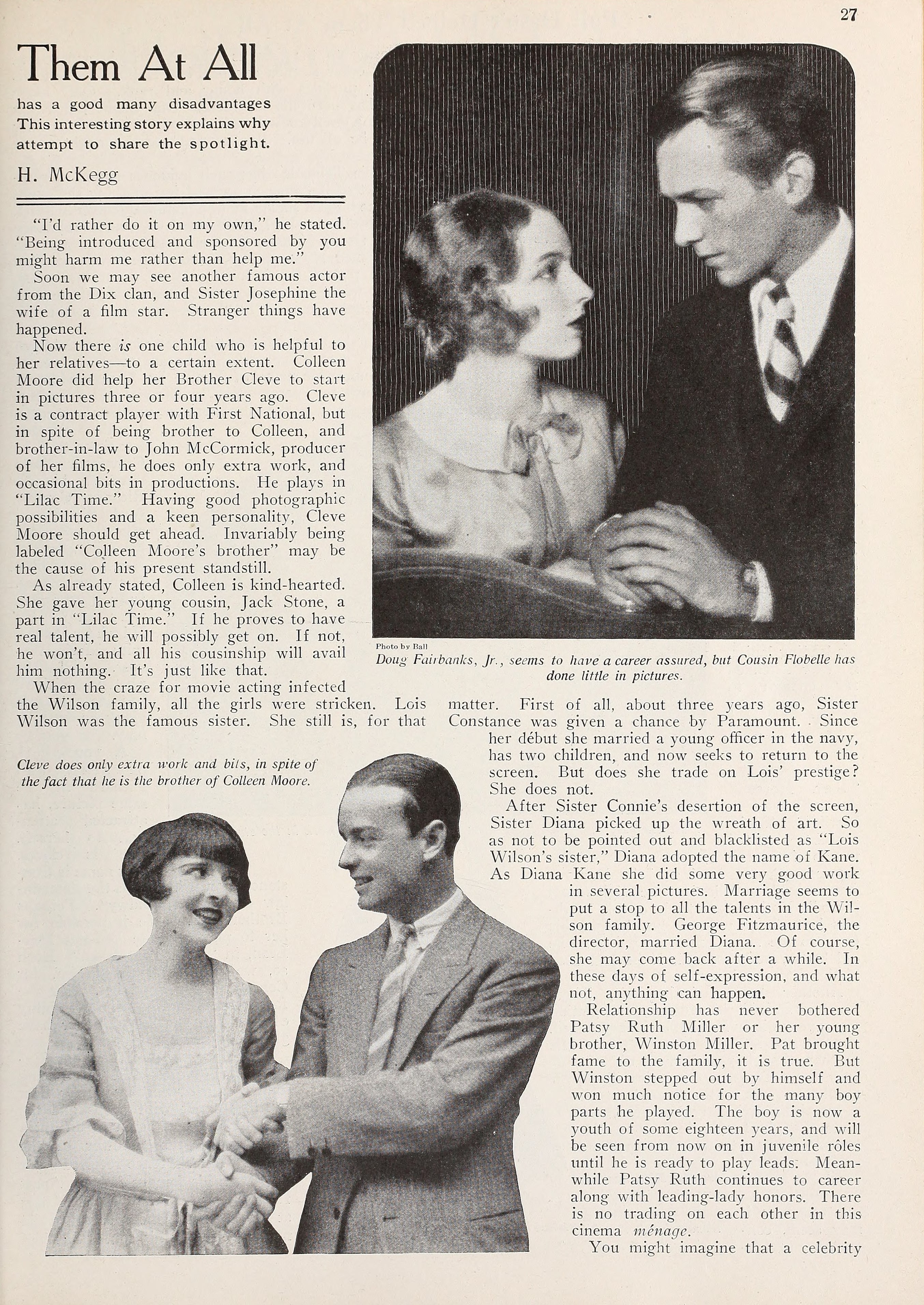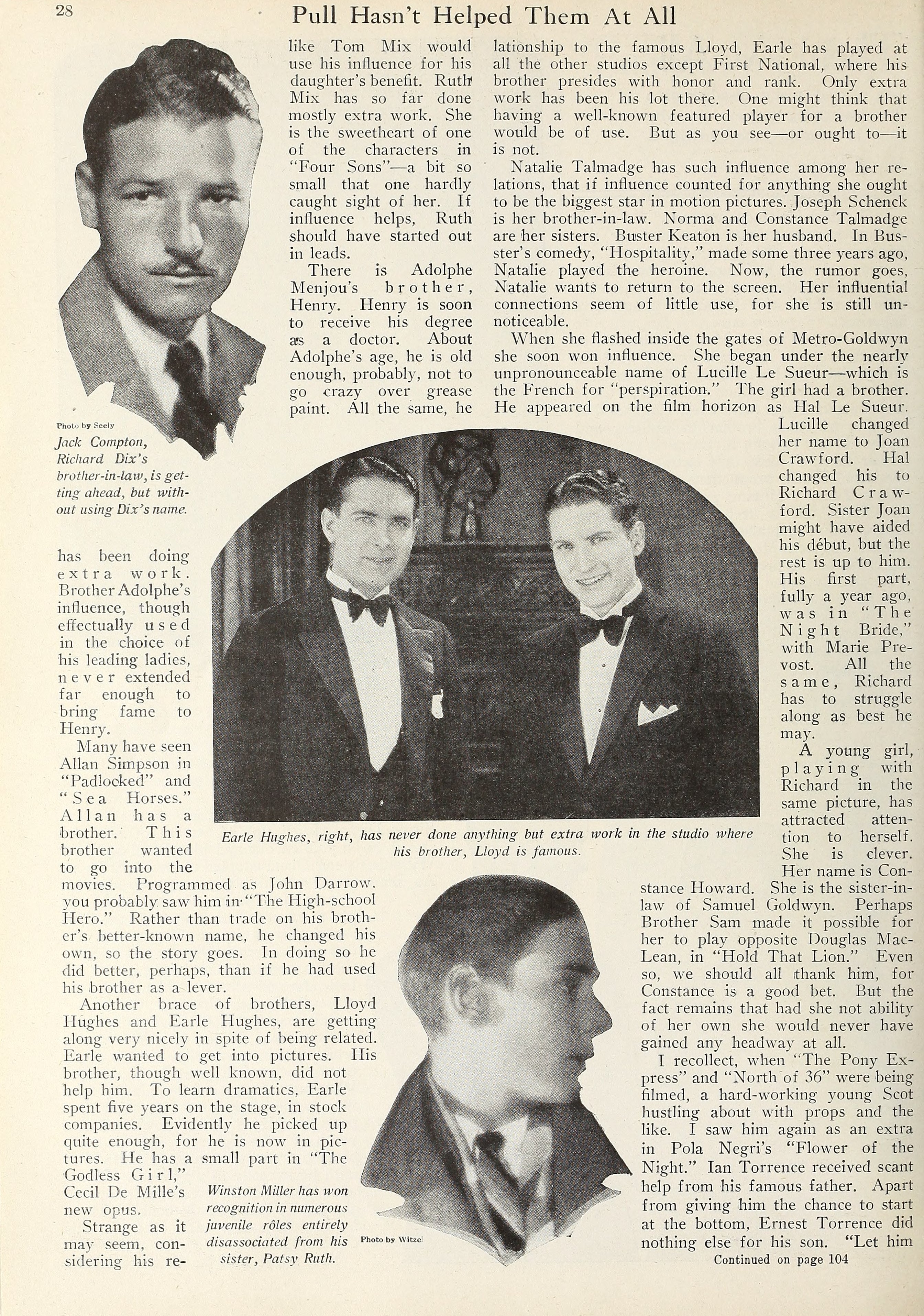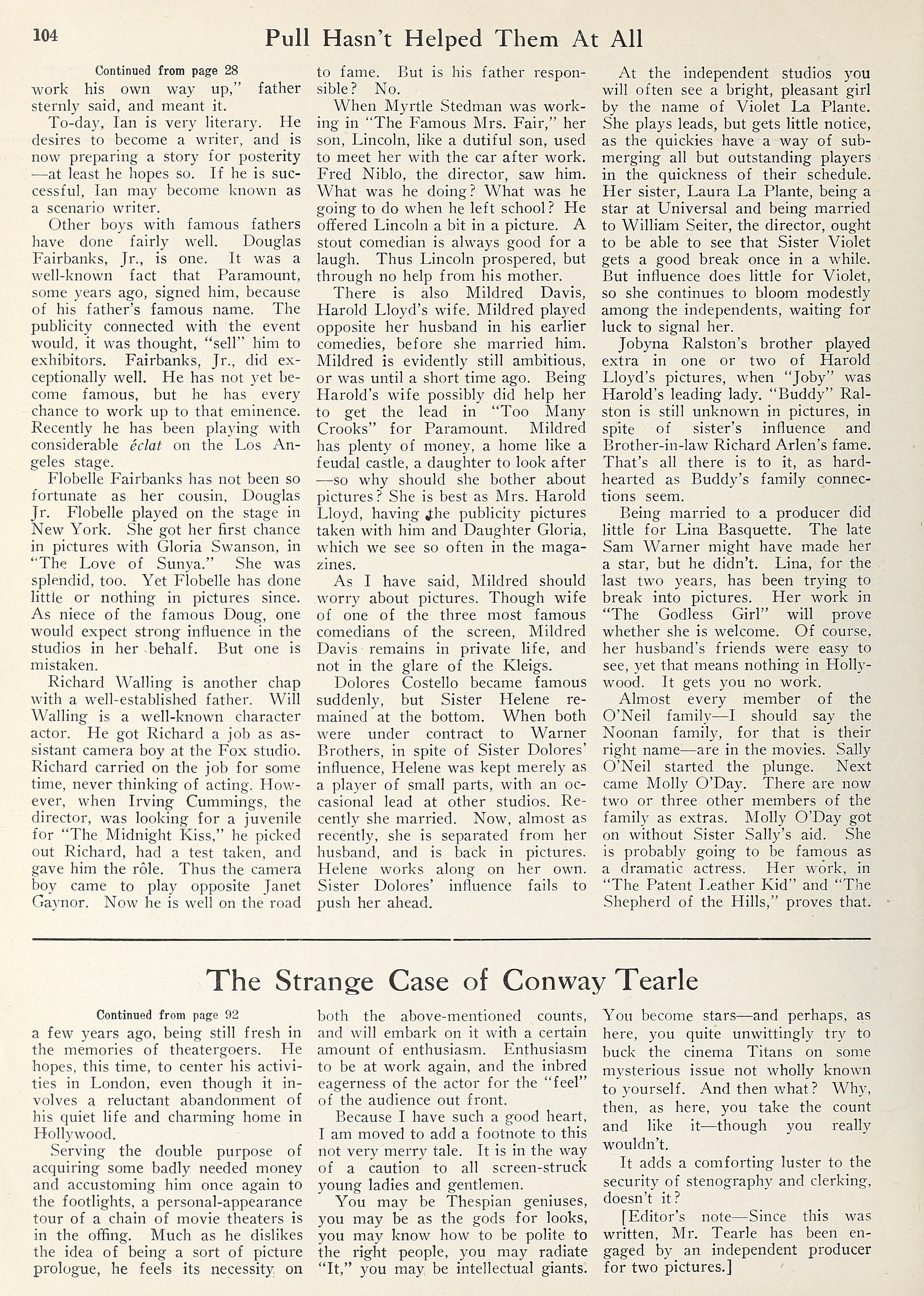Pull Hasn’t Helped Them At All (1928) 🇺🇸

“Wheels within wheels, my dear —”
“Of course you know who her brother is — They’ll put the entire family in next.”
“That’s the way you get on, having a famous star for a sister.”
by William H. McKegg
This is what you often hear in Hollywood, around the studios, generally from those having failed to make the grade. Occasionally, they have good cause for complaint. Yet, if any of them had a director for a brother, wouldn’t they expect him to get them a position in a studio? I imagine they would — if only as supervisors.
In one way or another, to be connected with some high official, some star, or some director, is often more detrimental than helpful to screen aspirants. Casting directors are likely to think that you are being pushed ahead on account of your relationship, rather than for any ability you might possess, and are almost certain to pass you up and choose some one else.
Influence might help you in an executive department of the studios, but the screen is another thing. Ye poor director has to put up with being harassed almost to desperation by supervisors, but the world at large passes judgment on a player. If he is no good, he is no good. That’s the end of it.
About two years ago Vilma Banky’s brother paid her a visit. Julius evidently believed that Sister Vilma, knowing so many big people in the picture business, would help pave an easy opening for him. In this, Brother Julius was mistaken.
“Nem, nem,” Vilma told him at the time. “Go back and get work in some studio at home, and maybe some nice man like Mr. Goldwyn will come over to Europe, discover you, and give you a nice contract.”
This seemed vague encouragement to Julius. Nevertheless, he returned to Hungary. Not long ago, Vilma told me that her brother was busy working in pictures in Budapest, earning something like thirty-five dollars a week.
Suppose you were related to Richard Dix — don’t all shout at once — wouldn’t you expect it to bring you some “pull” in the game? Whether you would or not, his brother-in-law has to scout for his own jobs. Jack Compton, married to Richard’s charming sister, Josephine, is now gaining a foothold in the work. He has never used Dix’s name or influence at any time. Not that Richard has been mean enough to prevent him. Like a gallant fellow, he offered to aid if necessary. This, however, was declined by the self-confident Mr. Compton.
“I’d rather do it on my own,” he stated. “Being introduced and sponsored by you might harm me rather than help me.”
Soon we may see another famous actor from the Dix clan, and Sister Josephine the wife of a film star. Stranger things have happened.
Now there is one child who is helpful to her relatives — to a certain extent. Colleen Moore did help her Brother Cleve to start in pictures three or four years ago. Cleve is a contract player with First National, but in spite of being brother to Colleen, and brother-in-law to John McCormick, producer of her films, he does only extra work, and occasional bits in productions. He plays in Lilac Time. Having good photographic possibilities and a keen personality, Cleve Moore should get ahead. Invariably being labeled “Colleen Moore’s brother” may be the cause of his present standstill.
As already stated, Colleen is kind-hearted. She gave her young cousin, Jack Stone, a part in Lilac Time. If he proves to have real talent, he will possibly get on. If not, he won’t, and all his cousinship will avail him nothing. It’s just like that.
When the craze for movie acting infected the Wilson family, all the girls were stricken. Lois Wilson was the famous sister. She still is, for that matter. First of all, about three years ago, Sister Constance was given a chance by Paramount. Since her debut she married a young officer in the navy, has two children, and now seeks to return to the screen. But does she trade on Lois’ prestige? She does not.
After Sister Connie’s desertion of the screen, Sister Diana picked up the wreath of art. So as not to be pointed out and blacklisted as “Lois Wilson’s sister,” Diana adopted the name of Kane. As Diana Kane she did some very good work in several pictures. Marriage seems to put a stop to all the talents in the Wilson family. George Fitzmaurice, the director, married Diana. Of course, she may come back after a while. In these days of self-expression, and what not, anything can happen.
Relationship has never bothered Patsy Ruth Miller or her young brother, Winston Miller. Pat brought fame to the family, it is true. But Winston stepped out by himself and won much notice for the many boy parts he played. The boy is now a youth of some eighteen years, and will be seen from now on in juvenile roles until he is ready to play leads: Meanwhile Patsy Ruth continues to career along with leading-lady honors. There is no trading on each other in this cinema ménage.
You might imagine that a celebrity like Tom Mix would use his influence for his daughter’s benefit. Ruth Mix has so far done mostly extra work. She is the sweetheart of one of the characters in Four Sons — a bit so small that one hardly caught sight of her. If influence helps, Ruth should have started out in leads.
There is Adolphe Menjou’s brother, Henry. Henry is soon to receive his degree as a doctor. About Adolphe’s age, he is old enough, probably, not to go crazy over grease paint. All the same, he has been doing extra work. Brother Adolphe’s influence, though effectually used in the choice of his leading ladies, never extended far enough to bring fame to Henry.
Many have seen Allan Simpson in Padlocked and “Sea Horses.” Allan has a brother. This brother wanted to go into the movies. Programmed as John Darrow, you probably saw him in “The High-school Hero.” Rather than trade on his brother’s better-known name, he changed his own, so the story goes. In doing so he did better, perhaps, than if he had used his brother as a lever.
Another brace of brothers, Lloyd Hughes and Earle Hughes, are getting along very nicely in spite of being related. Earle wanted to get into pictures. His brother, though well known, did not help him. To learn dramatics, Earle spent five years on the stage, in stock companies. Evidently he picked up quite enough, for he is now in pictures. He has a small part in The Godless Girl, Cecil De Mille’s [Cecil B. DeMille] new opus.
Strange as it may seem, considering his relationship to the famous Lloyd, Earle has played at all the other studios except First National, where his brother presides with honor and rank. Only extra work has been his lot there. One might think that having a well-known featured player for a brother would be of use. But as you see — or ought to — it is not.
Natalie Talmadge has such influence among her relations, that if influence counted for anything she ought to be the biggest star in motion pictures. Joseph Schenck [Joseph M. Schenck] is her brother-in-law. Norma [Norma Talmadge] and Constance Talmadge are her sisters. Buster Keaton is her husband. In Buster’s comedy, Hospitality, made some three years ago, Natalie played the heroine. Now, the rumor goes, Natalie wants to return to the screen. Her influential connections seem of little use, for she is still unnoticeable.
When she flashed inside the gates of Metro-Goldwyn she soon won influence. She began under the nearly unpronounceable name of Lucille Le Sueur — which is the French for “perspiration.” The girl had a brother. He appeared on the film horizon as Hal Le Sueur.
Lucille changed her name to Joan Crawford. Hal changed his to Richard Crawford. Sister Joan might have aided his debut, but the rest is up to him. His first part, fully a year ago, was in “The Night Bride,” with Marie Prevost. All the same, Richard has to struggle along as best he may.
A young girl, playing with Richard in the same picture, has attracted attention to herself. She is clever. Her name is Constance Howard. She is the sister-in-law of Samuel Goldwyn. Perhaps Brother Sam made it possible for her to play opposite Douglas MacLean, in Hold That Lion. Even so, we should all thank him, for Constance is a good bet. But the fact remains that had she not ability of her own she would never have gained any headway at all.
I recollect, when “The Pony Express” and “North of 36” were being filmed, a hard-working young Scot hustling about with props and the like. I saw him again as an extra in Pola Negri’s “Flower of the Night.” Ian Torrence received scant help from his famous father. Apart from giving him the chance to start at the bottom, Ernest Torrence did nothing else for his son. “Let him work his own way up,” father sternly said, and meant it.
To-day, Ian is very literary. He desires to become a writer, and is now preparing a story for posterity — at least he hopes so. If he is successful, Ian may become known as a scenario writer.
Other boys with famous fathers have done fairly well. Douglas Fairbanks, Jr., is one. It was a well-known fact that Paramount, some years ago, signed him, because of his father’s famous name. The publicity connected with the event would, it was thought, “sell” him to exhibitors. Fairbanks, Jr., did exceptionally well. He has not yet become famous, but he has every chance to work up to that eminence. Recently he has been playing with considerable éclat on the Los Angeles stage.
Flobelle Fairbanks has not been so fortunate as her cousin, Douglas Jr., Flobelle played on the stage in New York. She got her first chance in pictures with Gloria Swanson, in The Love of Sunya. She was splendid, too. Yet Flobelle has done little or nothing in pictures since. As niece of the famous Doug, one would expect strong influence in the studios in her behalf. But one is mistaken.
Richard Walling is another chap with a well-established father. Will Walling is a well-known character actor. He got Richard a job as assistant camera boy at the Fox studio. Richard carried on the job for some time, never thinking of acting. However, when Irving Cummings, the director, was looking for a juvenile for “The Midnight Kiss,” he picked out Richard, had a test taken, and gave him the role. Thus the camera boy came to play opposite Janet Gaynor. Now he is well on the road to fame. But is his father responsible? No.
When Myrtle Stedman was working in The Famous Mrs. Fair, her son, Lincoln, like a dutiful son, used to meet her with the car after work. Fred Niblo, the director, saw him. What was he doing? What was he going to do when he left school? He offered Lincoln a bit in a picture. A stout comedian is always good for a laugh. Thus Lincoln prospered, but through no help from his mother.
There is also Mildred Davis, Harold Lloyd’s wife. Mildred played opposite her husband in his earlier comedies, before she married him. Mildred is evidently still ambitious, or was until a short time ago. Being Harold’s wife possibly did help her to get the lead in “Too Many Crooks” for Paramount. Mildred has plenty of money, a home like a feudal castle, a daughter to look after — so why should she bother about pictures? She is best as Mrs. Harold Lloyd, having the publicity pictures taken with him and Daughter Gloria, which we see so often in the magazines.
As I have said, Mildred should worry about pictures. Though wife of one of the three most famous comedians of the screen, Mildred Davis remains in private life, and not in the glare of the Kleigs.
Dolores Costello became famous suddenly, but Sister Helene remained at the bottom. When both were under contract to Warner Brothers, in spite of Sister Dolores’ influence, Helene was kept merely as a player of small parts, with an occasional lead at other studios. Recently she married. Now, almost as recently, she is separated from her husband, and is back in pictures. Helene works along on her own. Sister Dolores’ influence fails to push her ahead.
At the independent studios you will often see a bright, pleasant girl by the name of Violet La Plante. She plays leads, but gets little notice, as the quickies have a way of submerging all but outstanding players in the quickness of their schedule. Her sister, Laura La Plante, being a star at Universal and being married to William Seiter [William A. Seiter], the director, ought to be able to see that Sister Violet gets a good break once in a while. But influence does little for Violet, so she continues to bloom modestly among the independents, waiting for luck to signal her.
Jobyna Ralston’s brother played extra in one or two of Harold Lloyd’s pictures, when “Joby” was Harold’s leading lady. “Buddy” Ralston is still unknown in pictures, in spite of sister’s influence and Brother-in-law Richard Arlen’s fame. That’s all there is to it, as hard-hearted as Buddy’s family connections seem.
Being married to a producer did little for Lina Basquette. The late Sam Warner might have made her a star, but he didn’t. Lina, for the last two years, has been trying to break into pictures. Her work in The Godless Girl will prove whether she is welcome. Of course, her husband’s friends were easy to see, yet that means nothing in Hollywood. It gets you no work.
Almost every member of the O’Neil family — I should say the Noonan family, for that is their right name — are in the movies. Sally O’Neil started the plunge. Next came Molly O’Day. There are now two or three other members of the family as extras. Molly O’Day got on without Sister Sally’s aid. She is probably going to be famous as a dramatic actress. Her work, in The Patent Leather Kid and “The Shepherd of the Hills,” proves that.

If Richard Crawford and Constance Howard make good it won’t be because of Sister Joan or Brother-in-law Samuel Goldwyn.
Photo by: Elmer Fryer (1898–1944)
Being brother to Jobyna, wife of Richard Aden, hasn’t helped “Buddy” Ralston at all.

Doug Fairbanks, Jr., seems to have a career assured, but Cousin Flobelle has done little in pictures.
Photo by: Russell Ball (1891–1942)
Cleve does only extra work and bits, in spite of the fact that he is the brother of Colleen Moore.

Earle Hughes, right, has never done anything but extra work in the studio where his brother, Lloyd is famous.
Jack Compton, Richard Dix’s brother-in-law, is getting ahead, but without using Dix’s name.
Photo by: Walter Fredrick Seely (1886–1959)
Winston Miller has won recognition in numerous juvenile roles entirely disassociated from his sister, Patsy Ruth.
Photo by: Albert Witzel (1879–1929)

Collection: Picture Play Magazine, August 1928
